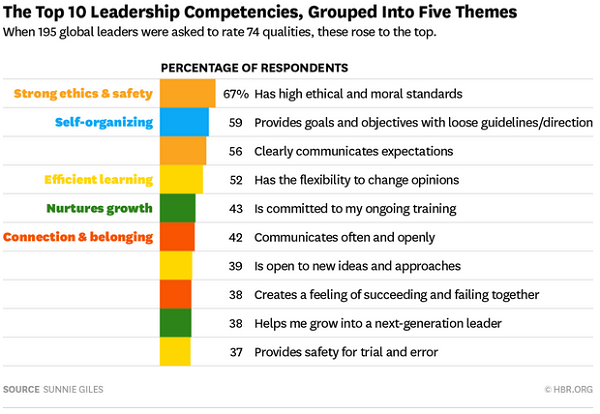Important Leadership Competencies
Introduction
What makes an effective leader?
Based on research from around 200 leaders in 15 countries working for 30+ global organisations; participants were asked to rank 15 of the most important leadership competencies from a list of 74.
The most important capabilities centre around people focus like soft skills and emotional intelligence, not confidence nor experience, ie less to do with authority and more related to basic human needs, ie survival and improving things.
There are 5 major themes of competencies which are difficult to master as they require people to act against their nature, ie
"...Individuals are not hardwired to relinquish control or be open to small failures..."
Sunnie Giles, 2016

Five competencies
i) high ethical standards and providing a safe environment (under this heading are attributes 'high ethical and moral standards' and 'communicating clear expectations' that are highly ranked; these are about creating a safe and trusting environment, ie
"... A leader with high ethical standards and basic commitment to fairness, instilling confidence that both they and their employees know the rules of the game. Similarly, when leaders clearly communicate their expectations, they avoid blindsiding people and ensure that everyone is on the same page. In a safe environment employees can relax, invoking the brain's higher capacity for social engagement, innovation, creativity, and ambition..."
Sunnie Giles, 2016
This eliminates any sense of uncertainty and allows staff to be more productive
Need to be consistent with your values so that not making decisions and performing actions that are at odds with your principles, etc; focus communications on making people feel safe, ie
"...acknowledge and neutralise fears or consequences from the outset..."
Sunnie Giles, 2016
eg when approaching a conversation about an activity that's gone wrong, start by saying 'I'm not trying to blame anyone. I just want to understand what happened.')
ii) empowering individuals to self-organize (allow staff autonomy, ie organise their own time and work; delegate authority and decision-making to those who are closest to the action; many managers struggle to let people self-organise as they have a fear of negative consequences from subordinate's decision making and mistakes; additionally, managers don't like relinquishing power; yet sharing power is a great way to increase influence)
Research has shown at this willingness to share power and influence provides benefits:
"...empowered teams are more productive and proactive, provide better customer service, and show higher levels of job satisfaction to their team and organisation..."
Sunnie Giles, 2016
iii) promoting connection and belonging among employees (humans are social beings, ie like attachment; this attitude encourages staff to improve performance especially in a safe, caring environment, ie people
"...who 'communicate often and openly' and 'create a feeling of succeeding or failing together as a pack' build a strong foundation for connection. We are a social species - we want to connect and feel a sense of belonging..."
Sunnie Giles, 2016
This belonging increased the chance of survival in prehistoric times. Now it has an impact on productivity and emotional well-being in the workplace; just watching an unpleasant interaction between workers can make others feel emotionally depleted.
Some simple ways to promote belonging and connection include
- smile at people
- call them by their name, especially their first name
- remember their interests
- remember family members' names
- pay focused attention when in conversation, ie speaking or listening, with them
- develop a song, motto, symbol, chant, ritual, etc that uniquely identifies members of your group
iv) open to new ideas and experimentation (show openness to new ideas and foster organisational learning, eg learn and grow from mistakes; greater diversity of ideas; to encourage learning we need to be
- 'flexible enough to change opinions'
- 'open to new ideas and approaches'
- 'providing safety for trial and error'.
Need to ensure that everyone is open to learning and even changing course.
"...try to approach problem-solving discussions without a specific agenda or outcome. Withhold judgement until everyone has spoken, and let people know that all ideas will be considered. A great diversity of ideas will emerge..."
Sunnie Giles, 2016
Failure is part of the learning process; need to encourage staff to take chances, ie risk-taking; one way to do this is to use controlled experiments that allow for small failures and provide rapid feedback for modification; build a platform for recording collective intelligence so that staff can learn from each other's mistakes.
v) nurture growth (being committed to the professional and personal growth of employees by 'being committed to on-going training', and 'helping me grow a next-generation leader'; humans have a natural desire to nurture and teach; give staff a sense of gratitude and desire to reciprocate and show loyalty).
